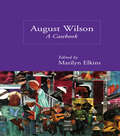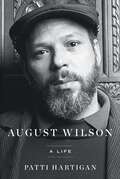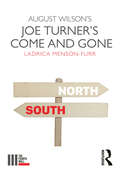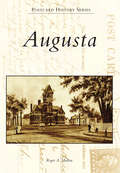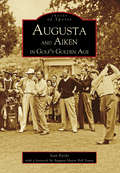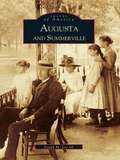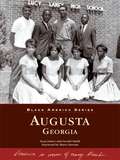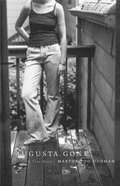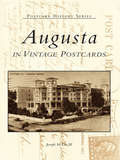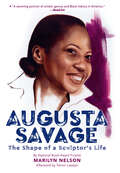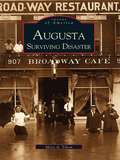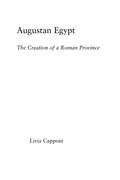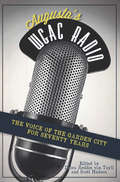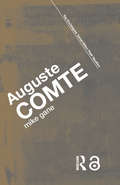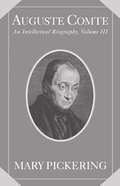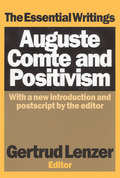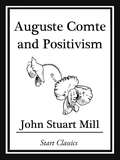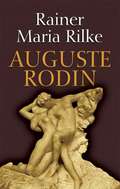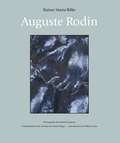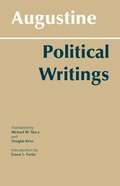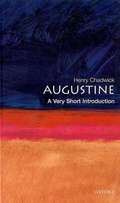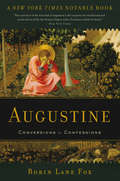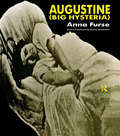- Table View
- List View
August Weismann
by Frederick B. ChurchillAugust Weismann's 1892 theory that inheritance is transmitted through eggs and sperm provided the biological mechanism for natural selection. In this full-length biography, Frederick Churchill situates Weismann in the swirling intellectual currents of his day and shows how his work paved the way for the modern synthesis of genetics and evolution.
August Wilson: A Casebook (Casebooks on Modern Dramatists #Vol. 15)
by Marilyn ElkinsFirst Published in 2000. Routledge is an imprint of Taylor & Francis, an informa company.
August Wilson: A Life
by Patti HartiganThe first authoritative biography of August Wilson, the most important and successful American playwright of the late 20th century, by a theater critic who knew him.August Wilson wrote a series of ten plays celebrating African American life in the 20th century, one play for each decade. No other American playwright has completed such an ambitious oeuvre. Two of the plays became successful films, Fences, starring Denzel Washington and Viola Davis; and Ma Rainey&’s Black Bottom, starring Viola Davis and Chadwick Boseman. Fences and The Piano Lesson won the Pulitzer Prize for Drama; Fences won the Tony Award for Best Play, and years after Wilson&’s death in 2005, Jitney earned a Tony Award for Best Revival of a Play. Through his brilliant use of vernacular speech, Wilson developed unforgettable characters who epitomized the trials and triumphs of the African American experience. He said that he didn&’t research his plays but wrote from &“the blood&’s memory,&” a sense of racial history that he believed African Americans shared. Author and theater critic Patti Hartigan traced his ancestry back to slavery, and his plays echo with uncanny similarities to the history of his ancestors. She interviewed Wilson many times before his death and traces his life from his childhood in Pittsburgh (where nine of the plays take place) to Broadway. She also interviewed scores of friends, theater colleagues and family members, and conducted extensive research to tell the story of a writer who left an indelible imprint on American theater and opened the door for future playwrights of color.
August Wilson's Joe Turner's Come and Gone (The Fourth Wall)
by Ladrica Menson-Furr"Herald Loomis, you shining! You shining like new money!" - Bynum Walker August Wilson considered Joe Turner’s Come and Gone (1984) to be his favourite play of the ten in his award-winning Pittsburgh Cycle. It is a drama that truly examines the roots, crossroads, and intersections of African, American, and African American culture. Its characters and choral griots interweave the intricate tropes of migration from the south to the north, the effects of slavery, black feminism and masculinity, and Wilson's theme of finding one's "song" or identity. This book gives readers an overview of the work from its inception on through its revisions and stagings in regional theatres and on Broadway, exploring its use of African American vernacular genres—blues music, folk songs, folk tales, and dance—and nineteenth-century southern post-Reconstruction history. Ladrica Menson-Furr presents Joe Turner's Come and Gone as a historical drama, a blues drama, an American drama, a Great Migration drama, and the finest example of Wilson's gift for relocating the African American experience in urban southern cities at the beginning and not the end of the African American experience.
Augusta (Postcard History Series)
by Roger A. MadoreBuilt in 1754 on the eastern bank of the Kennebec River, Fort Western became one of the first permanent settlements in what would eventually become Augusta and, in 1827, the capital of Maine. Through innovations in publishing by Gannett & Morse and Vickery & Hill, textiles by the Edwards Manufacturing Company, and lumber production along the Kennebec, Augusta thrived and prospered. Water Street flourished into the business and cultural center of the city, while Green and Winthrop Streets became some of the area's most opulent residential neighborhoods. A trolley system and the Maine Central Railroad station tied Augusta to surrounding communities and allowed visitors to come from far and wide and spend many a night at the famed Augusta House.
Augusta and Aiken in Golf's Golden Age (Images of Sports)
by Stan Byrdy Augusta Mayor YoungThe game of golf got its start in the Southeastern United States in 1892 on four holes with sand greens at Palmetto Golf Club in Aiken, South Carolina. Within five years, Palmetto had expanded to eighteen holes and the first nine-hole course in neighboring Augusta, Georgia was designed at the Hotel Bon Air. For half a century, the Augusta-Aiken area flourished as the winter destination of choice for the rich, famous, and powerful in America. Presidents Taft, Harding, and Eisenhower vacationed here. Baseball great Ty Cobb bought a home in Augusta's quaint Summerville neighborhood. It was here that Bobby Jones began the improbable journey towards a Grand Slam, then built his dream golf course. By the turn of the century, winter tourism and grand resort hotels in the Augusta-Aiken area were well established. A favorable winter climate and easy rail access drew vacationers to Highland Park Hotel (1866), Willcox Hotel (1898), and Park in the Pines (1900) in Aiken; Hotel Bon Air (1890) and Partridge Inn (1913) in Augusta; and Hampton Terrace Hotel and Golf Club (1903) in North Augusta. Resorts in Florida and the growth of the air travel industry later coupled to mark the area's decline in winter tourism, but not before Augusta-Aiken's place in golf history was secure. In this unique volume, vintage images and accompanying text recall the unfo rgettable legends, the meticulously maintained courses, and all of the grandeur associated with the game.
Augusta and Summerville
by Joseph M. Lee IIIAugusta and Summerville showcases rare nineteenth-century stereoviews and photographs from the extensive collection of Joseph M. Lee III and the Augusta Museum of History, spanning a 41-year period from 1859 to 1900. The engaging images within these pages were captured on film by some of Augusta's earliest photographers, including J.W. Perkins, JohnUsher Jr., J.A. Palmer, and H.C. Hall, among others. Most of the images have never been published and provide an unusually valuable source of information about Augusta and its environs. Known the world round for its pristine landscapes and "Garden City" charm, Augusta has always been a photographer's dream. Lush, verdant scenes recall a city yet unmarked by the scars of expansion, still enjoying the tranquility of life in the Old South. Views of early businesses and homes on Broad and Greene Streets, the flood of 1888, local monuments, historic churches and cemeteries, pioneering schools, the early cotton crop, and area waterwaysall contribute to this visual journey. The reader will delight in scenes of yesteryear, diving deep into the annals of one of Georgia's most beloved cities.
Augusta, Georgia (Black America Series)
by Sean Joiner Marva Stewart Gerald SmithFilled with remarkable vintage photographs, Black America: Augusta, Georgia captures the essence of the African-American heritage in this historic Southern community. The Garden City has produced a wide variety of intellectual and political pioneers, including a handful of educators who were instrumental in the pivotal Brown versus Board of Education case. Within the pages of this volume, their stories unfold.
Augusta, Gone
by Martha Tod Dudman"I'm not telling you where I am. Don't try to find me." Remember Go Ask Alice? Augusta, Gone is the memoir Alice's mother never wrote. A single parent, Martha Tod Dudman is sure she is giving her two children the perfect life, sheltering them from the wild tumult of her own youth. But when Augusta turns fifteen, things start to happen: first the cigarette, then the blue pipe and the little bag Augusta says is aspirin. Just talking to her is like sticking your hand in the garbage disposal. Martha doesn't know if she's confronting adolescent behavior, craziness, her own failures as a parent -- or all three. Augusta, Gone is the story of a girl who is doing everything to hurt herself and a mother who would try anything to save her. It is a sorrowful tale, but not a tragic one. Though the book charts a harrowing course through the troubled waters of adolescence, hope -- that mother and daughter will be reunited and will learn to love one another again -- steers them toward a shore of forgiveness and redemption. Written with darkly seductive grace, Augusta, Gone conjures the dangerous thrill of being drawn into the heart of a whirling vortex. This daring book will be admired for its lyricism, applauded for its courage, and remembered for its power. It demands to be read from start to finish, in one breathless sitting.
Augusta in Vintage Postcards (Postcard History Series)
by Joseph M. Lee IIIIn the early 1900s, America was swept up in the postcard craze. All over the country, people seized on these charming snapshots of life as a means of keeping in touch with friends and family, as well as seeing strange and exciting parts of the world.
Augusta Savage: The Shape of a Sculptor's Life
by Marilyn NelsonA Claudia Lewis Award Winner for Poetry by the Bank Street College of Education A Black Caucus ALA Children & Young Adult Award Winner A CCBC Children&’s Choice • A CBC Teacher Favorite This powerful biography in poems tells the life of Augusta Savage, the trailblazing artist and pillar of the Harlem Renaissance. Augusta Savage was arguably the most influential American artist of the 1930s. A gifted sculptor, Savage was commissioned to create a portrait bust of W.E.B. Du Bois for the New York Public Library. She flourished during the Harlem Renaissance, and became a teacher to an entire generation of African American artists, including Jacob Lawrence, and would go on to be nationally recognized as one of the featured artists at the 1939 World&’s Fair. She was the first-ever recorded Black gallerist. After being denied an artists&’ fellowship abroad on the basis of race, Augusta Savage worked to advance equal rights in the arts. And yet popular history has forgotten her name. Deftly written and brimming with photographs of Savage&’s stunning sculpture, this is an important portrait of an exceptional artist who, despite the limitations she faced, was compelled to forge a life through art and creativity. Features an afterword by the curator of the Art & Artifacts Division of the Schomburg Center for Research in Black Culture. NAMED ONE OF THE BEST BOOKS OF THE YEAR BY Horn Book • Kirkus Reviews • School Library Journal • Bank Street College ★ "A stunning portrait of artistic genius and Black history in America." —Booklist, starred review ★ "A wonderful addition to young people&’s literature on African American artists." —Horn Book, starred review ★ "In a rich biography in verse, Nelson (A is for Oboe) gives voice to the Black sculptor Augusta Savage (1892-1962), a key Harlem Renaissance figure." —Publishers Weekly, starred review ★ "Nelson&’s arresting poetry, which is accompanied by photographs of Savage&’s work, dazzles as it experiments with form. … A lyrical biography from a master of the craft." —Kirkus Reviews, starred review ★ "A master poet breathes life and color into this portrait of a historically significant sculptor and her remarkable story." —School Library Journal, starred review
Augusta Surviving Disaster: Surviving Disaster (Images of America)
by Misty A. TilsonAugusta: Surviving Disaster allows readers to glimpse the changes that mother nature and human error have wrought on the landscape and design of the "Garden City." These disasters did not only alter the city's landscape; many were the impetus for change in Augusta. The ravaging floods led to the construction of the levee along the Savannah River in 1919, to prevent flooding, and spurred the creation of the Clark Hill Dam and Reservoir. Within this volume, readers will get a glimpse of the damagecaused by the floodwaters of the Savannah River and the Augusta Canal. The remains of St. Paul's Episcopal Church, as well as other homes and businesses, after the Great Fire of 1916 are captured. Historic photographs reveal the damaged remains of the Lower Market after the 1878 tornado. Culled from the extensive collection of the Augusta Museum of History and the personal collection ofJoseph M. Lee III, these images provide testimony to the resiliency of the human spirit and the courage to move forward and rebuild. The citizens of Augusta have a long history of uniting for the common good, and this volume is a tribute to those who overcameobstacles to create the thriving community that exists today.
Augustan Egypt: The Creation of a Roman Province (Studies in Classics)
by Livia CapponiFirst published in 2005. Routledge is an imprint of Taylor & Francis, an informa company.
Augusta's WGAC Radio: The Voice of the Garden City for Seventy Years
by Debra Reddin van Tuyll Scott HudsonWGAC is the No. 1-rated radio station in Augusta. It has weathered the transition in American radio from local stations with local programming to corporately owned stations that feature syndicated programming, and it has been able to do so without giving up its local character. As a news-talk radio station today, WGAC is the first place most Augustans go to find out what is happening nationally and locally, and its morning drive-time and afternoon drive-time show hosts and news personnel are some of the most beloved and respected media figures in Augusta. This book will trace the history of this community landmark from its infancy to its status today as a community institution. It will highlight the people who have created the programming for which WGAC is known and also the people like James Brown who have used the station to launch important careers. The book will also discuss Fuqua's broadcasting technology innovations such as advances in acoustics engineering and early television technology. The history will also cover the station's decades-long support of the Master's Golf Tournament, which has led to it becoming the official radio station of the Master's.
Auguste Comte (Key Sociologists)
by Mike GaneAuguste Comte is widely acknowledged as the founder of the science of sociology and the 'Religion of Humanity'. In this fascinating study, the first major reassessment of Comte’s sociology for many years, Mike Gane draws on recent scholarship and presents a new reading of this remarkable figure. Comte’s contributions to the history and philosophy of science have decisively influenced positive methodologies. He coined the term ‘sociology’ and gave it its first content, and he is renowned for having introduced the sociology of gender and emotion into sociology. What is less well known however, is that Comte contributed to ethics, and indeed coined the word ‘altruism’. In this important work Gane examines Comte's sociological vision and shows that, because he thought sociology could and should be reflexive, encyclopaedic and utopian, he considered topics such as fetishism, polytheism, fate, love, and the relations between sociology, science, theology and culture. This fascinating account of the birth of sociology is an unprecedented introductory text on Comte. Gane’s work is an essential read for all sociologists and students of the discipline.
Auguste Comte: An Intellectual Biography
by Mary PickeringThis book constitutes the first volume of a projected two-volume intellectual biography of Auguste Comte, the founder of modern sociology and a philosophical movement called positivism. Volume One offers a reinterpretation of Comte's "first career," (1798-1842) when he completed the scientific foundation of his philosophy. It describes the interplay between Comte's ideas and the historical context of postrevolutionary France, his struggles with poverty and mental illness, and his volatile relationships with friends, family, and colleagues, including such famous contemporaries as Saint-Simon, the Saint-Simonians, Guizot, and John Stuart Mill. Pickering shows that the man who called for a new social philosophy based on the sciences was not only ill at ease in the most basic human relationships, but also profoundly questioned the ability of the purely scientific spirit to regenerate the political and social world.
Auguste Comte and Positivism: The Essential Writings
by Gertnid LenzerAlthough Auguste Comte is conventionally acknowledged as one of the founders of sociology and as a key representative of positivism, few new editions of his writings have been published in the English language in this century. He has become virtually dissociated from the history of modern positivism and the most recent debates about it. Gertrud Lenzer maintains that the work of Comte is, for better or for worse, essential to an understanding of the modern period of positivism. This collection provides new access to the work of Comte and gives practitioners of various disciplines the possibility of reassessing concepts that were first introduced in Comte's writings.Today much of the ordinary business of academic disciplines is conducted under the assumption that the realm of science is essentially separate from the realms of politics and science. A close reading of Comte will reveal how deeply such current ideas and theories were originally embedded in a particular political context. One of his central methodological principles was that the theory of society had to be removed from the arena of political practice precisely in order to control that practice by means of these same sciences. It is in Comte's work that the reader will be able to observe how the forces of social and political reaction began to be powerfully organized to combat the critical forces in its own and later eras. Auguste Comte and Positivism will be of importance to the work of philosophers, sociologists, political theorists, and historians.
Auguste Comte and Positivism
by John Stuart MillOne of the foremost figures of Western intellectual thought in the late 19th century, John Stuart Mill offered up examinations of human rights, personal and societal rights and responsibilities, and the striving for individual happiness that continue to impact our philosophies, both private and political, to this day. This concise but explosive essay is perhaps the best example of how far-reaching-and necessary on an ongoing basis-his thinking was. In this 1865 work, Mill discusses the rational "religion" of French philosopher and social scientist Auguste Comte, reviewing his fellow thinker's great treatise on human behavior as knowable, quantifiable, and correctable from both positive and negative angles, "endeavouring to sever," the author writes, "what in our estimation is true, from the much less which is erroneous." English philosopher and politician JOHN STUART MILL (1806-1873) served as an administrator in the East Indian Company from 1823 to 1858, and as a member of parliament from 1865 to 1868. Among his essays on a wide range of political and social thought are Principles of Political Economy (1848), Considerations on Representative Government (1861), and The Subjection of Women (1869).
Auguste Rodin (Dover Fine Art, History of Art)
by Rainer Maria RilkeDuring the early 1900s, the great German poet lived and worked in Paris with Auguste Rodin. In a work as revealing of its author as it is of his famous subject, Rainer Maria Rilke examines Rodin's life and work, and explains the often elusive connection between the creative forces that drive timeless literature and great art.Rilke served for several years as Rodin's secretary — living in the sculptor's workshops, watching the shaping of his creations, and discussing his views and ideas. Written in 1903 and 1907, these essays about the master's work and development as an artist mark Rilke's entry into the world of letters. Rodin himself paid the poet the ultimate tribute, declaring these meditations the supreme interpretation of his work. This excellent translation, complemented by 33 illustrations, will fascinate students of literature, philosophy, and art history.
Auguste Rodin (Lives Of The Artists Ser.)
by Rainer Maria Rilke William H. Gass Michael Eastman Daniel SlagerSculptor Auguste Rodin was fortunate to have his secretary Rainer Maria Rilke, one of the most sensitive poets of our time. These two pieces discussing Rodin¢s work and development as an artist are as revealing of Rilke as they are of his subject. Written in 1902 and 1907, these essays mark the entry of the poet into the world of letters. Rilke¢s description of Rodin reveals the profound psychic connection between the two great artists, both masters of giving visible life to the invisible. Michael Eastman¢ evocative photographs of Rodin¢s sculptures shed light on both Rodin¢s art and Rilke¢s thoughts and catapult them into the 21st century.
Augustine: Political Writings
by Augustine Ernest L. Fortin Douglas KriesThe best available introduction to the political thought of Augustine, if not to Christian political thought in general. Included are generous selections from City of God, as well as from many lesser-known writings of Augustine.
Augustine: A Very Short Introduction
by Henry ChadwickAugustine was arguably the greatest early Christian philosopher. His teachings had a profound effect on Medieval scholarship, Renaissance humanism, and the religious controversies of both the Reformation and the Counter-Reformation. Here, Henry Chadwick places Augustine in his philosophical and religious context and traces the history of his influence on Western thought, both within and beyond the Christian tradition. A handy account to one of the greatest religious thinkers, this Very Short Introduction is both a useful guide for the one who seeks to know Augustine and a fine companion for the one who wishes to know him better.
Augustine: The City of God against the Pagans
by R. W. Dyson Augustine Of HippoThis is the first new rendition for a generation of The City of God, the first major intellectual achievement of Latin Christianity and one of the classic texts of Western civilization. Robert Dyson has produced a complete, accurate, authoritative and fluent translation of De Civitate Dei, edited together with full biographical notes, a concise introduction, bibliography and chronology of Augustine's life. The result is an important contribution of interest to students of theology, philosophy, ecclesiastical history, the history of political thought and late antiquity.
Augustine: Conversions To Confessions
by Robin Lane FoxSaint Augustine is one of the most influential figures in all of Christianity, yet his path to sainthood was by no means assured. Born in AD 354 to a pagan father and a Christian mother, Augustine spent the first thirty years of his life struggling to understand the nature of God and his world. He learned about Christianity as a child but was never baptized, choosing instead to immerse himself in the study of rhetoric, Manicheanism, and then Neoplatonism--all the while indulging in a life of lust and greed. In Augustine, the acclaimed historian Robin Lane Fox re-creates Augustine’s early life with unparalleled insight, showing how Augustine’s quest for knowledge and faith finally brought him to Christianity and a life of celibacy. Augustine’s Confessions, a vivid description of his journey toward conversion and baptism, still serves as a model of spirituality for Christians around the world. Magisterial and beautifully written, Augustine will be the definitive biography of this colossal figure for decades to come.
Augustine (Contemporary Theatre Studies #Vol. 20)
by Anna FurseFirst Published in 1997. Routledge is an imprint of Taylor & Francis, an informa company.

